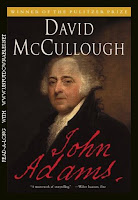Wallace at Unputdownables is hosting a John Adams readalong, and if you haven't joined in yet, you really should. This week we are discussing Chapter 2: True Blue.
While the first chapter focused primarily on developing Adams as a person, the second chapter situates readers within the time period. Like with the first chapter, the second is divided into three sections. The first section clearly paints a picture of Philadelphia where Adams spent so much time pontificating with the other members of Congress. Not that it's particularly important, but it is sort of fun....."There were as many as thirty bookshops and twice the number of taverns and coffeehouses." With a population of approximately 30,000 people, that's a crazy number of books and bars. My kind of place. :)
True Blue touches on the "sessions" of Congress, moving from 1774 to 1775 to 1776, and I enjoyed the progression. During the First Continental Congress in 1774, Adams says he shall be "killed with kindness in this place...We go to Congress at nine and there we stay, most earnestly engaged until three in the afternoon, then we adjourn and go to dinner...and feast on ten thousand delicacies, and sit drinking Madeira, claret and burgundy 'til six or seven." Later when discussing the meeting of delegates for the Second Continental Congress in 1775, Adams, "though suffering from rheumatism and a violent cold, worked twelve to fourteen hours a day, in committee meetings from seven to ten in the morning, then to the full Congress till late afternoon, then back to committees from six to ten at night." The heightening tension over this period is clearly seen in descriptions such as these and in the debate over reconciliation and independence.
What most surprised me in this chapter is finding out that so few were ready to fight for independence even in early 1776. Most were actually very much opposed to separating from England, instead urging reconciliation, an increase in rights and representation. While the battle had begun, at Lexington and Concord, the fight was not yet - technically - the war for independence. The reality of war did influence the colonies to be a bit more receptive to the idea of independence, but it wasn't until May 15, 1776 that the Congress finally approved a preamble which declared the colonies independent. Adams was the author of this preamble, and more importantly, he was the man who actually stood up and laid it out for Congress in the first place. But it wasn't until June 1776 that Jefferson finally sat down and wrote the Declaration of Independence. And that writing is where the chapter ends.
So much has happened in the first two chapters that I feel I am doing the book a great disservice with my meager summaries and half-formed thoughts. Then again, I don't feel like I have enough knowledge yet to give you fully formed thoughts. While I am not having a problem understanding the text at all, I do feel a little lost as to depth. I have had to stop reading a few times and do a quick Google search on a name or event mentioned but not elaborated upon in the book. Then again, this is probably because I am a giant idgit regarding American history....
And now my friends, on to reading the third chapter: Colossus of Independence (isn't that a great title?)

Thanks for the review. I need to add more of these books to my list
ReplyDeleteAnn
I know almost nothing about Adams, so I am eager to follow along with these posts and see if this is a book for me. Sometimes I have trouble with reading history, which is odd, because I love historical fiction so much!
ReplyDeleteI, too, am having a hard time breaking the chapters down into summaries. There is just so much happening and the chapters are so rich with information that it's hard to know where to start!
ReplyDeleteI am also stopping and looking things and people up to find out more information. I love it when a book has me wanting to research, though... often they are my favorite kinds (because I feel involved and interested)!
I hadn't really thought about the importance of having some background knowledge of the events while reading the book, mainly because I'm familiar with it as a history teacher. But you're right. I think I've been so won over by his engaging writing style that I didn't stop to think that he doesn't go into much depth on some of these people in the process.
ReplyDeleteWhat I love about McCullough's writing style is that he gives you just enough information about the other characters that we care enough to want to know more about them! Thank God for Google!
ReplyDeleteYes, I agree about the depth. There is so much going on in each chapter.
ReplyDeleteI also love the title of Chapter 3